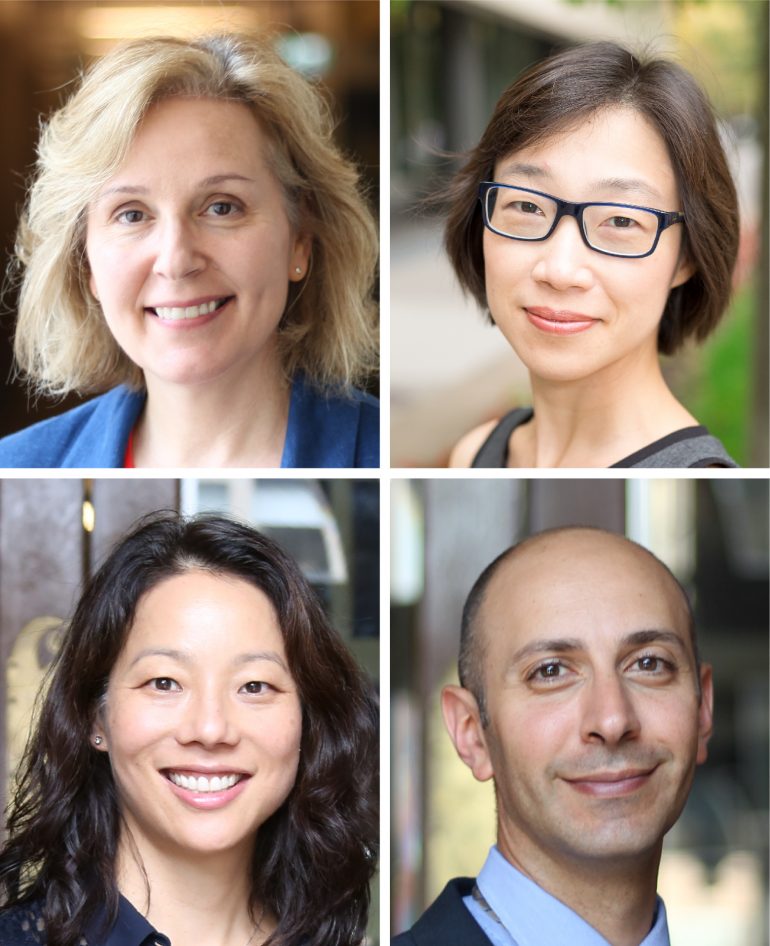On July 1st, four faculty members from the Institute of Biomaterials and Biomedical Engineering (IBBME) were promoted based on their research excellence and significant academic contributions to the Institute over the years. Dr. Margaret Hai-Ling Cheng, Naomi Matsuura, and José Zariffa were promoted to the Associate Professor rank, and Dr. Julie Audet was promoted to the Professor rank.
“I’m extremely proud of our faculty members and their willingness to push the boundaries of research in biomedical engineering.” said Professor Warren Chan, director of IBBME.

Julie Audet
Professor Audet’s research is focused on the development of biological search algorithms and their applications in stem and progenitor cell manufacturing processes. She is currently the Vice-Dean of Graduate Studies in the Faculty of Applied Science and Engineering at the University of Toronto. In recent years, Dr. Audet has participated in the development and launch of the Master’s of Engineering in Biomedical Engineering, at IBBME and the emphasis in Analytics within FASE. Professor Audet has been an instructor and coordinator of several undergraduate and graduate courses covering Statistical Design of Experiments, all of which are closely related to her research interests.

Margaret Hai-Ling Cheng
Professor Margaret Hai-Ling Cheng’s research focuses on technological innovations and applications in quantitative magnetic resonance (MR) imaging.
From real-time cardiac MR acquisition strategies to novel chemistries for tracking therapeutic stem cells and implants, the Cheng Lab implements a multi-disciplinary strategy to solve critical roadblocks to the early diagnosis of heart disease and the translation of novel therapies in tissue engineering and regenerative medicine. Our most recent innovations include a new non-invasive imaging platform for detecting microvascular dysfunction in deep tissue, contrast agents for tracking embryonic stem cells, and the basis for monitoring scaffolds for 3D tissue regeneration. Ongoing efforts are underway to detect heart disease at early stages in diabetic and hypertensive subjects, to build new cardiac tissue guided by our emerging MR image-guidance technologies, and to incorporate artificial intelligence for optimized MR imaging workflow.
Dr. Cheng is also a principle investigator at Medicine by Design.

Naomi Matsuura
Professor Matsuura’s research program is based on the design of new theranostic agents for the personalized treatment of cancer for individual patients. Her group designs new biocompatible and clinically translatable agents for radiosensitization of hypoxic tumours and for minimally-invasive, image-guided, local and site-specific delivery of cancer therapies to tumours in vivo. Her group is also developing nanoscale drug carriers that can be remotely activated using medical imaging sources for cancer imaging for targeted anticancer therapy in situ.
Dr. Matsuura is also a faculty member at the Department of Material Science and Engineering at the University of Toronto.

José Zariffa
Dr. José Zariffa’s research focuses on developing technology that can help restore function after neurological injuries, such as spinal cord injury or stroke, with a particular emphasis on upper limb neurorehabilitation. For example, to evaluate the true impact of rehabilitation strategies on daily life, his team is developing a system to measure hand function at home using wearable cameras. Looking to the next generation of assistive technologies, they have introduced novel strategies to interpret neural signals and create direct interfaces with the nervous system. He is a recipient of an Ontario Early Researcher Award. His research has additionally been supported by NSERC, the Rick Hansen Institute, the Craig H. Neilsen Foundation, the Heart and Stroke Foundation of Canada, the Wings for Life Spinal Cord Research Foundation, Toronto Rehab, and IBBME.
Dr. Zariffa is also a research scientist at Toronto Rehabilitation Institute (KITE) and University Health Network (UHN).


